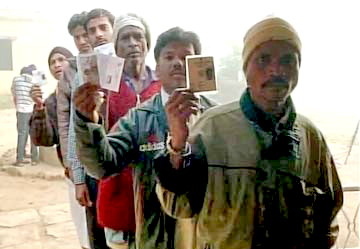 Raipur, Nov 11: Voting for the first phase of Chhattisgarh assembly polls in 18 constituencies of Naxal-hit Bastar region and Rajnandgaon district began on a slow note on Monday with 10% electorate exercising their franchise in the first few hours, amid a bomb attack by Naxals in Kanker district that left a policeman injured.
Raipur, Nov 11: Voting for the first phase of Chhattisgarh assembly polls in 18 constituencies of Naxal-hit Bastar region and Rajnandgaon district began on a slow note on Monday with 10% electorate exercising their franchise in the first few hours, amid a bomb attack by Naxals in Kanker district that left a policeman injured.
"Polling in 12 constituencies of Bastar and one in Rajnandgaon district begun from 7am while in the rest of the seats in Rajnandgaon, it started at 8am. So far, around 10% polling has been registered," an official with the office of Chief Electoral Officer said.
Voting, however, failed to kick start in two hyper sensitive polling booths - Chhote Pakhanjore and Sitaramaiyya- of Kanker as polling parties were unable to reach the destination owing to Naxal resistance, he said.
A police personnel was injured when a pressure bomb laid by Naxals exploded in Kanker.
An encounter between security forces and Maoists was also reported near some polling booths in Naxal-hit Dantewada district of southern Chhattisgarh.. But polling is so far going smoothly in that region, he added.
A total of 143 candidates from 12 constituencies are in the fray in Bastar division and six constituencies of Rajnandgaon district with an electorate of 29,33,200 in the first of the two-phase polls to the 90-member assembly in the state where chief minister Raman Singh is aiming for an hat-trick.
Maximum number of candidates have been fielded in two constituencies- Rajnandgaon and Jagdalpur (14 in each) and least number of candidates are in Konta (4).
The fate of Raman Singh and his three ministers- Kedar Kashyap, Lata Usendi and Vikram Usendi- besides kin of the victims of Jiram valley Naxal attack will be sealed today.
A total of 4,142 polling booths have been set up for this phase of which 1,517 are sensitive booths while 1,311 are hyper-sensitive stations.
Out of the 18 seats, BJP had won 15 while Congress had three in the last election.
The rest 72 constituencies, including Bilaspur and state-capital Raipur, are scheduled for polls on November 19.
A large number of security force personnel have been deployed across the state to ensure peaceful polling.
A total of 562 companies (56,200 personnel) have been recently sent by the Centre for security related duty in addition to existing 40 battalions (40,000 men and women) of paramilitary forces engaged in anti-Naxal operations and other security related duty in the state.






Comments
Add new comment